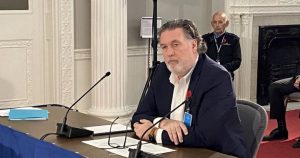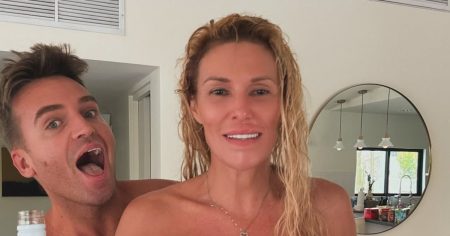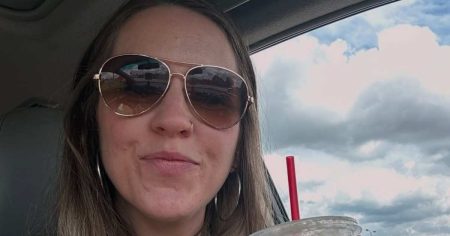Brandi Glanville, former star of “The Real Housewives of Beverly Hills,” has been battling a mysterious and debilitating health issue for the past year and a half, leading her on a costly and frustrating medical odyssey. The 52-year-old reality TV personality has described a range of symptoms, most notably swelling in her face that has at times rendered her unable to speak. This swelling, coupled with other undisclosed symptoms, has severely impacted her quality of life, forcing her to withdraw from social activities and draining her finances as she seeks answers. Glanville estimates she has spent approximately $70,000 on medical tests and treatments, a significant financial burden compounded by her inability to work for the past two years due to her health struggles.
The most recent development in Glanville’s health saga involves a potential diagnosis of a parasitic infection. After undergoing extensive testing, including lab work costing $10,000, several doctors have suggested that a parasite may be the root of her problems. This theory, while still unconfirmed, offers a potential explanation for the persistent and unusual symptoms Glanville has been experiencing. She describes the sensation of something moving beneath the skin of her face, and observing what appear to be tiny bubbles bursting when she touches the affected area. This unsettling phenomenon further supports the possibility of a parasitic infestation, though further investigation is needed to confirm the diagnosis.
Glanville suspects she may have contracted the parasite during the filming of “The Real Housewives Ultimate Girls Trip” in Morocco. She points to the practice of leaving food, including meat, sitting out for extended periods in the Moroccan heat as a possible source of contamination. Her symptoms began approximately six months after her return from filming, lending credence to this theory. However, it is important to note that this is currently speculation, and a definitive link between her time in Morocco and her current health issues has not been established. Adding to the complexity of the situation, Glanville’s involvement in the “Ultimate Girls Trip” was marred by allegations of sexual harassment against fellow cast member Caroline Manzo, allegations which Glanville denies. While the season has yet to air, this controversy adds another layer of stress to an already difficult period in Glanville’s life.
The potential parasite diagnosis has introduced a new level of anxiety and uncertainty into Glanville’s health journey. She describes the physical sensation of the parasite moving under her skin, a disturbing experience that has understandably caused significant distress. In addition to the facial swelling, Glanville reports that the parasite seems to be producing excess fluid, which her lymph nodes are struggling to drain. This further complicates the situation and adds to the discomfort she is experiencing. The emotional toll of living with such an unsettling and unpredictable condition is undoubtedly immense, as evidenced by Glanville’s public pronouncements of her frustration and desperation for answers.
While doctors are exploring various treatment options, Glanville is understandably eager for a resolution. She has expressed willingness to undergo surgery to remove the parasite, but medical professionals are currently prioritizing non-invasive approaches. A course of antibiotics provided temporary relief for about five days, but the symptoms returned after she discontinued the medication due to the prohibitive cost of $2,000 per week. This financial strain exacerbates the already stressful situation, highlighting the challenges faced by individuals navigating complex and expensive medical treatments. Glanville’s public sharing of her health struggles sheds light on the financial burdens that can accompany chronic illness and the difficult decisions patients often face regarding treatment affordability.
Glanville’s journey underscores the complexities of diagnosing and treating unusual medical conditions. The lengthy process of elimination, the significant financial investment, and the emotional toll of uncertainty all contribute to the challenges she has faced. While the possibility of a parasitic infection offers a potential explanation for her symptoms, it also introduces a new set of concerns and anxieties. As Glanville continues to seek answers and pursue treatment, her story serves as a reminder of the often arduous and unpredictable nature of medical journeys and the importance of persistent advocacy for one’s own health. Her willingness to share her struggles publicly, despite the personal and potentially embarrassing nature of her symptoms, highlights the need for greater awareness and understanding of the challenges faced by individuals battling chronic and often mysterious illnesses. Glanville’s openness provides a platform for discussion about the emotional, physical, and financial burdens of such conditions, and hopefully encourages others facing similar challenges to seek support and persevere in their pursuit of wellness.










